Spring 2025 Events Programme
CORTH Conversation: Exploring care in rituals of social reproduction in Southern Tanzania
Date: 8th April, 12noon to 2pm BST
Location: C333 (Arts C) and over Zoom (please email corth@sussex.ac.uk for the Zoom details)
Hybrid talk featuring Kaja Skoftedalen, CORTH's new PhD visiting researcher from the University of Bergen
Much research focuses mainly on care as processes and actions occurring within health institutions and the family home. However, caring is a social activity that occurs in a wide range of spaces outside of what is usually in focus. Kaja's PhD project aims to explore spaces of social care in a broader sense by looking at how ritual activities are interconnected with the social reproduction of relations, hierarchies, norms and values. Caring, in these spaces, forms and strengthens but also challenges social bonds. Ritual interactions sometimes also involve non-human beings, who also play central roles in how people experience and initiate care and wellbeing.
Kaja Skoftedalen has just joined CORTH as a visiting researcher from the University of Bergen, where she is a PhD candidate at the Centre for International Health, Department of Global Public Health and Primary Care.
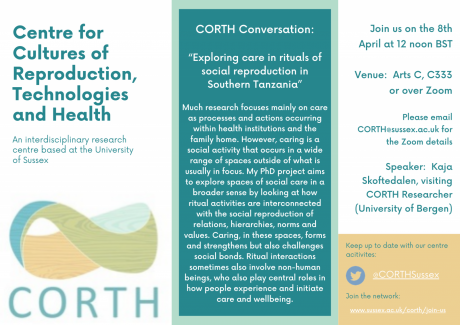
Dancing Surrogacy
Date: 28th March, 4pm to 6pm GMT
Location: GSRC (Arts C) (please register at TicketSource)
Join our dance session where we imagine surrogacy through our own embodied expression and share our thoughts combining music and movement.
The workshop is led by co-Director Dr. Maria Moscati (LPS) and Director Maya Unnithan (Anthropology)
If you are interested in attending the event, please register for a ticket (admission is free) at https://www.ticketsource.co.uk/global-studies-school-university-of-sussex/t-avnroxr

'Women's Empowerment: A Question of Education?' Talk
Date: 18th March, 11am to 12.30pm GMT
Location: GSRC (Arts C) and over Zoom (please see https://www.tickettailor.com/events/universityofsussex14/1540031 for details)
On the 18th March, Professor Anna Robinson-Pant is giving a talk with the Centre of International Education (CIE) and CORTH titled Women’s Empowerment: A Question of Education?
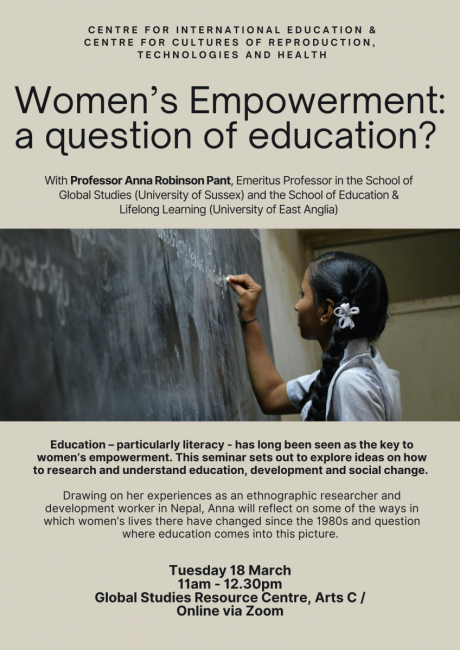
Do Doctors Really Understand Women's Health?
Date: 12th March 2025, 12:30 to 1:30pm GMT
Location: Online (Zoom)
An online event to celebrate International Women's Day.
Medical research has long overlooked the impact of female hormonal cycles, leaving critical gaps in healthcare. This affects everyone – trans and non-binary people and cis women - and it is relevant to us all because our health is interconnected.
In this upbeat and inclusive talk, Dr Chi Eziefula, Associate Professor at BSMS, and Jane Dancey, Somatic Health Practitioner and Educator, will explore some of the latest research on nutrition, brain and bone health, exercise and stress – and why hormonal cycles matter across a lifetime.
Do wellness trends like fasting and high-intensity exercise work the same for people with cycling hormones as for those without?
Join us as we challenge outdated assumptions, get curious about what we don’t know and explore what it looks like to thrive in a body with cycling hormones.
Free to attend and all welcome, this event is celebrating International Women's Day 2025. Register for the event at https://www.bsms.ac.uk/about/events/2025/03-12-do-doctors-really-understand-womens-health.aspx
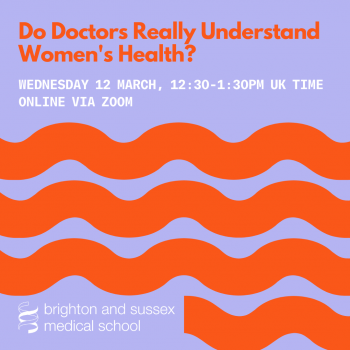
Research Fora
Date: 13th February, 12.30noon to 2.30pm GMT
Location: C333 (Arts C) and over Zoom (please email corth@sussex.ac.uk for details)
The Centre for Cultures of Reproduction, Technologies, and Health (CORTH) at the School of Global Studies is pleased to invite doctoral students and PGRs to present their work as part of our Spring Term CORTH Research forum to be held on 13th February 2025. This is an opportunity to present work at any stage to a friendly audience made up of Centre students and faculty.
Who can apply?
Your presentation should reflect on an aspect of gender, sexuality, sexual/reproductive health, feminist theory, kinship, broadly. We welcome scholars from a wide range of disciplinary locations to share their work with us. You don’t need to be an existing member of the Centre to present (although please join us if you haven’t already!)
How to apply?
Please send titles and short abstracts (100 words) to corth@sussex.ac.uk with the subject line as ‘CORTH Research fora 2025’.
When is the deadline?
Please apply by 31st January, 2025.
If you have any questions about the forum, please email corth@sussex.ac.uk
Previous Events
CORTH Conversations: "The psychosocial experiences of donor conceived young adults"
Date: 25th November, 12noon to 2pm GMT
Location: GSRC (Arts C) and over Zoom (please email corth@sussex.ac.uk for details)
CORTH is joined by Sophie Zadeh, who will be presenting a talk on "The psychosocial experiences of donor conceived young adults."
Sophie joined the School of Psychology at Sussex in March 2024 as a Reader in Family Psychology. Her research focuses on experiences of parents and children (including adult children) in non-normative family forms, including families formed through sperm donation, egg donation, and surrogacy. She has also studied parents' and children's perspectives and experiences in families in which there are two mums or two dads, and families headed by transgender parents.
Research in Progress Forum
Date: 29th October, 2pm to 4pm
For this Semester’s ‘Research in Progress’ Forum, the Centre welcomed 5 PhD candidates and Early Career Researchers to discuss their work in front of an audience of follow students, researchers and academics.
The Forum began with Dr. Janice Lazarus, who presented their research on ‘Contagion of Stigma and abortion decision-making within unmarried women’s experiences of abortion in India.’ While abortion has been legally available in India since 1971, access to care is not equitable for all those who seek it, with literature on abortion reflecting that unmarried women often experience judgement and stigma while seeking abortion care due to widely prevalent Brahmanical Patriarchal (caste and gender) norms that forbid women from engaging in out-of-marriage sex. Janice’s doctoral research looked at unmarried women's experiences and presented findings related to the 'Contagion of Stigma' as a patriarchal mechanism to control women's bodies, sexualities, romantic and sexual liaisons, and reproductive capabilities.
The next researcher to present their work was Lea Happ with ‘Feminist politics of knowledge and care in contemporary Argentine abortion activisim,’ which examined feminist activism and abortion access in post-legalisation Argentina. Following decades of feminist mobilisation, Argentina legalised abortion on demand and free of charge until the 14th week in late 2020; Lea’s thesis asked what happens after legalisation, focusing on activist affective and embodied practices and imaginations.
Caroline Rainer then showcased their work on ‘Decriminalise Sex Work: Health and Safety First,’ and the grassroots work being done by The English Collective of Prostitutes (ECP) in calling for the decriminalisation of sex work, which has been proven to enhance health - since sex workers’ health is intrinsically tied up with criminalisation and poverty.
For the second half of the Forum, Doctoral researcher Ali Ramsey gave an overview of the work she had been doing interrogating media representations of menopause using found footage filmmaking techniques. Ali showed clips from her experimental documentary film 'Menopause: The Movie,’ which has been shortlisted by several film festivals, was a finalist in the top 3 documentaries at the LA Femme International Film Festival, won an award at the Women Over Fifty Film Festival and was screened at the launch of the AHRC funded Scholarly Association for Menopause Studies.
The Forum concluded with a presentation from Ritu Ghosh, discussing their work into ‘Legislating Reproductive Labor: Surrogacy in Contemporary India’ that investigates India’s new surrogacy legislation (only legally recognising altruistic surrogacy) as an instance of reproductive governance that naturalises and devalues marginalised women’s reproductive labour. Raising crucial questions for the ethics of rendering such corporeal, intimate, and affective labour as free, Ritu’s research explores how surrogate workers navigate the new bureaucracies of the contemporary Indian surrogacy industry, and how they secretly resist these structures to gain agency and create informal markets of reproductive labour.
CORTH’s Research in Progress forums are a valuable opportunity for PhD candidates and Early Career Researchers to receive feedback and exposure for their research in a friendly environment of similarly minded colleagues and faculty.
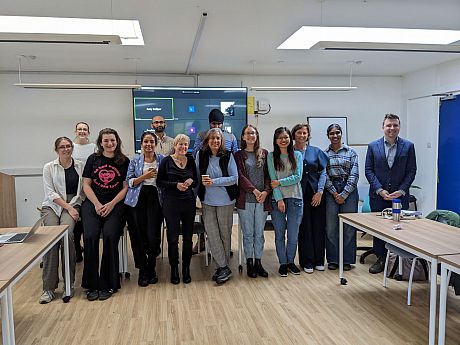
HIV, gender and the politics of medicine: Embodied democracy in the global south
Book Launch, featuring the author and CORTH co-Director Dr. Beth Mills
Date: 16th October, 4.30pm - 6pm
Location: Convening Space, 1st floor of the IDS building
Join us for this event with Elizabeth Mills, author of the new book HIV, Gender and the Politics of Medicine and former IDS PhD Student and Research Fellow. Dr Mills will be speaking with a panel of academics and activists from South Africa and the UK, to discuss the lessons from the global struggle for equitable access to life-saving HIV treatment. This will include the value of art, resistance and transnational activism when holding global and national institutions accountable to the embodied wellbeing of citizens. Each of the speakers have, for decades, been concerned with understanding the embodied ramifications of health inequalities around the world. After providing an overview of HIV, Gender and the Politics of Medicine, we will hear from the panelists as they reflect on the book and on their own trajectory of work in academia, art and activism around gender, health and democracy.
About the book
HIV, Gender and the Politics of Medicine centers on the lives of women who live with HIV in South Africa and who have navigated a complex assemblage of affective relationships, activist networks, government institutions and global coalitions to transform international and national health policies that govern access to essential HIV medicines. Drawing on 20 years of multi-sited ethnographic and policy research in South Africa, India and Brazil, the book foregrounds the value of understanding the embodied and political dimensions of health policy and reveals the networked threads that weave women’s embodied precarity into the governance of technologies and the technologies of governance. This study of women’s activism to access HIV medicine is not simply a study of the evolution of global and national health policy but one that reveals the extent to which policy becomes embodied, recognizing that bodies too are never the same and experience intersecting inequalities in profoundly unique ways. By focusing specifically on policies around access to HIV medicines at a national, transnational and global level, this book traces an important history - the struggle to access these medicines in the Global South – and brings this history into the present by articulating the lessons learnt by the activists and policy makers engaged in shaping these vital policies over the first two decades of the 21st century.
Speakers
- Elizabeth Mills, Senior Lecturer, Anthropology, Sussex University; CORTH Co-Director
- Hayley MacGregor, Professorial Research Fellow, IDS; CORTH Co-Director
- Nondumiso Hlwele, Artist, activist and member of the Bambanani Women’s Group, South Africa
- Maya Unnithan, Head of Anthropology, Sussex University; CORTH Director
- Lenore Manderson, Distinguished Professor of Public Health and Medical Anthropology, School of Public Health, University of the Witwatersrand, Johannesburg, South Africa
For further details about the event, and information on registering to attend, please visit IDS' website at HIV, gender and the politics of medicine: Embodied democracy in the global south - Institute of Development Studies (ids.ac.uk)
Surrogacy Workshop: "Surrogacy Beyond the Carceral: Culture, Law and Lived Experience"
Date: 27-28th June, 10am - 4pm
The Centre for Cultures of Reproduction, Technologies and Health, in collaboration with the Department of Liberal Arts, Indian Institute of Technology, Hyderabad, organised an international workshop on the 27th and 28th of June, 2024, in anticipation of its 10th anniversary. Titled ‘Beyond the Carceral: Culture, Law, and Lived Experience’, the workshop brought together scholars working on surrogacy to throw light on the various cultural and social ideas that underpin the concepts, language, and practice of surrogacy legislation.
The program was spread over four sessions, with each session focussing on different geographical regions and disciplinary locations. Researchers from the disciplines of law, sociology, anthropology, health and medicine, philosophy, among others, presented their work across the two days. The Director of CORTH, Maya Unnithan, introduced the workshop by commenting on the significance of speaking about surrogacy in a post-Roe world, where the implications of the law on people’s everyday reproductive dilemmas have become more pronounced in the contemporary moment than ever before. Co-director, Maria Moscati, in her opening comments, remarked on the need to have more comprehensive and holistic approaches to studying gender, sexuality and reproduction through interdisciplinary approaches. Co-organiser Anindita Majumdar, from the Indian Institute of Technology, Hyderabad, noted that collaborations across universities and countries are imperative to produce knowledge that is critical, timely, and inclusive.
On the limitations of children’s rights
Lottie Park-Morton, Senior Lecturer at the University of Gloucestershire, began her presentation by looking at how surrogacy law acts upon the regulation of parenthood in various contexts, specially through the rhetoric of the child’s best interests. Through her analysis of case studies from England and Wales, Sweden, and California, in the US, she concluded that a robust, consistent engagement with Child Rights Impact Assessments (CRIA) is essential in arbitrating cases over custody and parenthood in surrogacy. Professor Rachel Thomson, who chaired the session, was in agreement, opining that questions about the best interests of children disproportionately focus on biological lineage and legal parentage; but in reality, there are so many factors that contribute to what a happy childhood or a content life is. Marianna Iliadou, Lecturer, University of Sussex, asked if the discourse of reproductive rights can be used to adequately address people’s everyday experiences with sexual and reproductive injustice, when their implementation remains wildly inconsistent.
Jayna Kothari, Senior Advocate, Supreme Court of India, specifically addressed the law’s prohibition of single women’s rights to have children through surrogacy, contending that the state seeks to delegitimise forms of family formation that lie outside the heteronorm, pushing women into marriage in order to have children. Maria Moscati intervened to urge us to think about women’s rights in this context without essentialising what the juridical or political category of ‘woman’ itself meant. Based on the arguments made by Jayna, audience members and other panellists engaged in debate about how the protection of children and discussions on responsible parenting, the right to parent, single women’s right to parent, and queer couples’ rights to parent must not reinforce the idea that parenting is private, and enclosed within the nuclear family. We must think of long-term care of children that is communal, goes beyond the authority of just parental figures, and challenges the individualised, privatised notion of the family, while engaging in more communitarian, social models of childcare.
Governing intimate lives
Brian Tobin, Associate Professor in Law, University of Galway, looked at the impact of surrogacy law on culture and lived experience, and how they transform each other. Ireland has historically been reluctant to permit traditional surrogacy. This, he argues, is because Irish culture, historically, sees a very strong connection between the birth mother and the child. This is apparent in Ireland’s long and difficult regulations on abortion. His presentation summarily argued that although the Irish law proposes to allow surrogacy, in practice, it seeks only to discourage it or make it very difficult to access, on account of the country’s sanctification of normative maternal experiences. Rachel Thomson noted that the phrasing of mater semper in the Irish law signals how archaic and unchanging the idea of motherhood is supposed to be. In a similar vein, Elisa Baiocco, PhD scholar at the Sapienza University of Rome, looked at the Italian government’s recent proposal to make surrogacy a universal crime. She argued how this disenfranchises queer individuals and their aspirations to family-making, subjecting their intimate lives to disproportionate surveillance as a consequence. Skylab Sahu, Assistant Professor, Miranda House, Delhi, whose research is anchored in India, also brought in the question of legal inadequacy, arguing that a punitive framework marginalises queer individuals.
Reproducing the nation-state
Anika Konig, Substitute Professor, Freie University, Berlin, traced contemporary German regulation on assisted reproduction to histories of Nazi eugenics and nation-building, arguing that the way the German state seeks to regulate surrogacy reproduces visions of an imperialist racial past. Christina Weis, Senior Lecturer, De Montfort University, Leicester, spoke about the recent Russian bill of 2022 which prohibits surrogacy for single mothers, unmarried couples and foreigners to access surrogacy. This, she argues, reinforces the Russian constitution’s focus on the primacy of ‘traditional family values’, where only heterosexual nuclear families receive state and social legitimation. Anindita Majumdar, in her response to these presentations, urged us to think how the state continually keeps shifting the goalposts of eugenics, making questions of reproductive autonomy harder to navigate. States are invested heavily in the reproduction of the ‘right’ kind of citizenry, which results in the castigation of some women for wanting children, and some others for not wanting them. Authoritarian regimes therefore disproportionately scrutinise women’s bodies. Heather Jacobson, Professor, University of Austin, Texas, looked at how the state of Texas in the United States has emerged as a hub for surrogacy over the years. This, she argues, has been made possible as the state is well-known as being industry-friendly due to its lack of individual and corporate income tax, its large and diverse workforce, and a relatively thriving economy. Another contextualizating factor which facilitates surrogacy in Texas is the historically strong Evangelical Christian base in the state and the historic lack of controversy among evangelicals around ART-use by heterosexually-married couples during the time that the surrogacy industry was establishing and growing in the state.
The session was chaired by Maya Unnithan, who noted how legal and national histories, alongside economic and cultural histories operate in complex, intersecting ways. On the one hand, if both legal prohibition and legal sanction of ARTs are meant to protect vulnerable individuals, then how do they simultaneously engender precarities of different kinds, mobilising varying strands of carcerality in the everyday lives and experiences of people.
On reproductive labour
Sunhye Kim, Assistant Professor, Ehwa Women’s University, South Korea, who joined us online from Korea, focused on the meanings of reproductive labor in the transnational circuits of the ART industry in South Korea. By analyzing the embodied experiences of both intended parents and gestational surrogates when they participate in the baby-making process together, her paper examined how paid mothers (Ukrainian gestational surrogates) and unpaid mothers (Korean infertile women) perform their reproductive labour in similar and different ways when they work together to make a baby in the transnational Korean ART industry.
In the final session of the program, Prabha Kotiswaran, Professor, King’s College, London, and Madhushree Jana, post-doctoral Research Associate, King’s College, London, argued that state protections must not impinge on personal freedoms, and instead of a punitive regulatory framework, we must demand more robust protections for surrogate mothers and egg donors from a labour rights position. Aishwarya Chandran, PhD scholar at the University of Sussex, argued that the carceral turn in surrogacy legislation in India seeks to reinforce the biases that exist against the reproduction of migrant, Muslim and Dalit bodies, by pushing their livelihoods further into precarity. Priya Sharma, post-doctoral Fellow, Indian Institute of Technology, Bombay, posed similar questions, where she argued that legal deliberations over altruism and exploitation failed to account for women’s lived experiences of precarious waged work and familial obligation. The session was followed by animated discussions on the parallels between laws that regulate sex work and surrogacy, and how both of these forms of precarious, embodied work, essential to the processes of social reproduction, are implicated in the politics of governance through criminalisation.
The workshop helped us all think through several questions about reproductive freedom and justice, the state’s legitimisation and delegitimization of specific processes of family formation, the state’s vested interests in curtailing the reproduction of specific bodies while permitting the reproductive autonomy of certain other bodies. The presentations also urged us to think about reproductive coercion and reproductive pleasures outside of the framework of rights, where the need to expand the categories of what constitutes a family, what constitutes a woman, what constitutes individual liberty must be understood beyond legalistic frameworks, and through notions of interconnected, social living. The program was also helpful in thinking through feminist commitments towards reproductive and sexual freedoms, where the family, the neoliberal market, and the state all emerge as agents we must wrestle with and against to secure freedoms for all.
You can read the published articles that came out of the workshop in the Amicus Curiae Journal of the Society for Advanced Legal Studies, Vol. 6 No. 2 (2025): Series 2 | Amicus Curiae
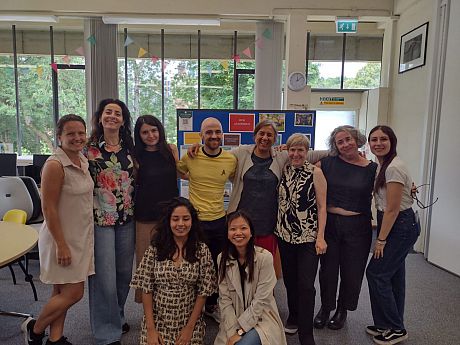
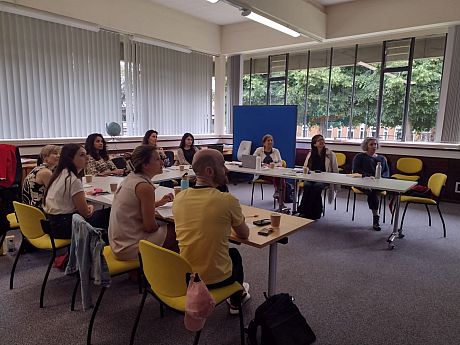
Download a pdf. copy of the above summary here
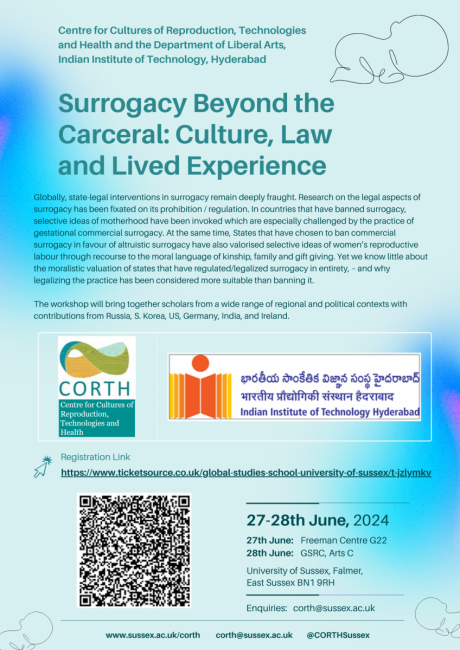
"Queering Global Health" Symposium
Date: 4th June, 9am BST onward
This summer Svati Shah (University of Massachusetts) and Paul Boyce (Sussex) co-convened three workshops on the themes of Queer and Trans World Anthropologies and Queer and Trans Global Health. The anthropology focused workshops were held in two parts, at The University of Sussex and at Future Africa, Pretoria, in association with Vasu Reddy and colleagues at The University of the Free State. The meetings convened scholars working on queer and transgender socialities and becomings from Southern and Eastern Africa and South Asia. Participants explored new ways of supporting and developing queer and trans anthropologies outside of Euro-North American academic transfer zones. Bringing together innovative scholarship, we sought to reorient queer and trans perspectives and research, opening out new ontologies and collaborative connections, based on a revisiting of ‘World Anthropology’ critiques from the Global South.
The third summer workshop, on Queer and Trans Global Health, focused on interdisciplinary scholarship in transnational health research, and was co-convened by Svati and Paul along with Beth Mills and Maria Moscati (Sussex). The workshop drew together scholars and activists working in China, Cuba, India, Indonesia, Kenya, Mozambique, Nepal, South Africa, the U.K. and the U.S. We explored normative power structures in the making and unmaking of global health knowledge, creative praxis, and queer and trans archiving.
Funds were provided by The University of Massachusetts, The University of Bergen, The University of the Free State and The University of Sussex (Global Studies HEIF funding).
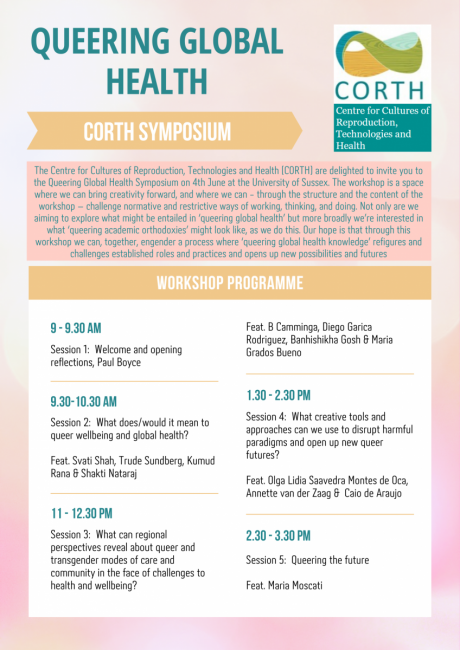
Research in Progress Forum
Date: 23rd May, 1pm BST onward
Location: A155 (Arts A) or over Zoom -
https://universityofsussex.zoom.us/j/3885139671?pwd=ajUyeEpRYmkrNDhGRk12OWtvenM0Zz09&omn=98363021867
Meeting ID: 388 513 9671 Passcode: 887084
The Centre for Cultures of Reproduction, Technologies, and Health (CORTH) at the School of Global Studies is pleased to invite doctoral students and PGRs to present their work as part of our Spring Term Researchers’ Forum, to be held on 23 May 2024. This is an opportunity to present work at any stage to a friendly audience made up of Centre students and faculty.
Presenters should be a current University of Sussex doctoral student and presentations should reflect on an aspect of reproduction - reproductive health, reproductive labour, reproductive technologies, legislation and law, sexuality, kinship, to name a few - which engages with scholarship on gender, sexuality, and/or feminist studies. Students don’t need to be an existing member of the Centre (although please join us if you haven’t already!). Presentations should be 15 minutes in total, followed by 5 minutes of Q&A. Refreshments provided.
For those who want to present but might not be selected for the current forum, we will host another research forum in October 2024.
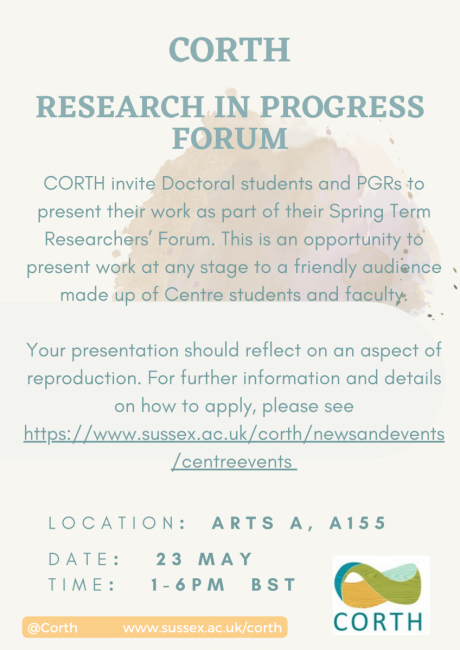

On the 25th January, CORTH’s Maria Moscati joins Juliana Cesario Alvim Gomes, CEU LEGS, in Vienna for an open conversation on ‘Reproductive Rights and Strategic Litigation’. This hybrid event takes place 12 noon to 2pm GMT. The Zoom details are below, or use the QR code on the poster.
Abstract: The conversation between Maria Moscati (CORTH/Sussex) and Juliana Cesario Alvim Gomes (LEGS/CEU) will explore legal mobilizations and judicial approaches to reproductive rights in Italy and Brazil, delving into differences, similarities, challenges, and strategies
Zoom Link: https://ceu-edu.zoom.us/j/7337555540?pwd=dXN5TTQvNzhwaWkzbFJmS1piSTdUQT09
ID: 733 755 5540
Password: 504096
CORTH's Autumn Event Programme

The Period Experience for Every Body
24 November 2023, 12:30 until 13:30, Meeting House
Following their popular session for International Women's Day earlier this year, BSMS and LifeScience colleagues have organised another discussion event on the topic of menstrual health with Dr. Chi Eziefula, Senior Lecturer at Brighton and Sussex Medical School (BSMS) and co-Director of CORTH, and guest speaker Jane Dancey, Somatic Health Practitioner and Educator.
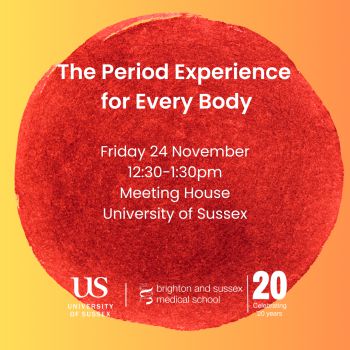
The Period Experience for Every Body : Staff Hub : University of Sussex
CORTH Conversations: 'Precarity of Hope, Uncertainty and Risk: unsettling expert and experiential knowledge of novel treatments for genetic disorders'
11 December 2023, 1 - 2.30pm GMT
This is a Hybrid event. Attendees can come in-person to Bramber Hourse room 235 or join online at https://universityofsussex.zoom.us/j/3885139671?pwd=ajUyeEpRYmkrNDhGRk12OWtvenM0Zz09 (Passcode 887084)

Dr. Chattoo's seminar is based on her paper that looks at the use of ‘novel’ therapies, a combination of thalidomide and hydroxyurea, in treating a potentially life- threatening genetic disorder (thalassemia). Rather than assume that medical knowledge constitutes (of) immutable stable diagnostic/ clinical categories or terms, a lack of consensus within medical/ scientific fraternity on the use of treatment regimens brings home the significance of local practices through which ‘evidence’ is framed to legitimise ‘improvisation’. In focusing on the social milieu within which the materiality of the disease is located, the notions of risk and evidence are foregrounded as processual and shifting in time. Drawing on ethnographic data on how parents of children with thalassemia in parts of rural India negotiate prognostic uncertainty and precarity of caring, knowledge and ignorance production appear as ‘intricately entangled’. The paper concludes with an ethnographer’s dilemma about how to write about what might seem, from the outside, ethically contentious though innovative practices, serving the economic interests of the clinicians and pharmaceutical firms. Yet, from inside, the narratives of parents and patients struggling to access basic care in the state system, persuade us to understand their quest for novel treatments (hope), ilaj (both treatment and cure), as part of a wider pragmatic ethic of care.
Dr. Sangeeta Chattoo is a Senior Research Fellow, in the department of Sociology, at the University of York. She started her ethnographic journey, dating back to her doctoral research on the borderland between medicine and culture in Kashmir (India) in 1985. After completing my doctorate from the University of Delhi in 1990, she taught at the University of Western Australia for two years, took a career- break for five years before joining the University of Leeds and finally migrating to York in 2006. Her research and scholarship have meandered around intersecting lines of medical knowledge and practice; inequalities and health, race, ethnicity, citizenship and governance; chronic illness, gender and caring. Sangeeta has worked extensively on health and citizenship issues of minoritised ethnic communities in the UK. For the past decade, however, she has been fascinated by the history, ontology and governance of sickle cell and thalassemia within a global context and the local engagements with emerging forms of medical practice and claims to citizenship and state. Sangeeta is on the editorial board of the medical sociology section of Frontiers and is currently co-editing a special issue (with Veena Das, Conceptualising technology in reframing the boundaries between the normal and the pathological; and a forthcoming, Handbook on Racism, Ethnicity and Health (with Hannah Bradby, Edward Elgar Press). Two of her recent articles are in Anthropology and Medicine and policy and Politics (profile at https://www.york.ac.uk/sociology/our-staff/academic/sangeeta-chattoo/)
CORTH Conversations: 'Empowering communities through University partnerships in public health: a pilot project in Nepal and the Philippines'

Anna is a Research Professor in the Global Studies School at Sussex. Laura is the project’s Research Assistant, a Lecturer in Global Public Health and a Researcher in decolonising health education at Sussex. Kamal is a Lecturer at the Research Center for Educational Innovation & Development (CERID) Tribhuvan University, Nepal and Teresa is a Professor with the University of Santo Tomas, the Philippines. Both Kamal and Teresa will be participating online.
Read all about the project and talk at -
'Parental Mental Health Network Conference' - An inaugural two-day Conference, bringing together academics, policy makers, clinicians, charities and people with lived experience. See the pdf. for full details of the Coference - Parental Mental Health Conference Itinerary [PDF 547.52KB]

CORTH Conversations: 'Human Rights in the Global Menstrual Movement'

View our past events here.


